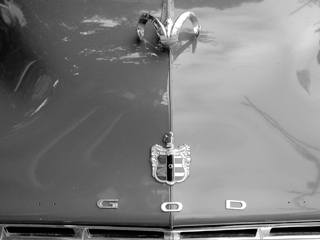| | 
9 August 2000- God Car
- I was walking through an affluent San Francisco neighborhood when I spotted the god car. The automobile was fifty or sixty or maybe even seventy years old—I really couldn’t tell since I know next to nothing about motor vehicles.
The god car looked pretty much as it must have appeared when it was new, except that some parts were a tad worse for wear, such as the chrome bits which were speckled with rust and corrosion. On the other hand, it had more coats of cherry red paint than anything that ever came off a Michigan assembly line. The distinguishing characteristic of the god car, though, was the name on the hood. The owner had removed the five characters that once spelled “DODGE,” discarded two of them, then rearranged the remaining three letters to spell “GOD.” At first, this editorial move struck me as obviously sacrilegious, but I quickly changed my mind. Many Americans worship their cars; the god car is an unapologetic acknowledgment of that practice. Although the god car is a lovely machine, it’s clearly a false idol. After all, a real god car would not rust. 
- 10 August 2000
- Same Stuff, Different Sauce
- I’m about to leave on a flight from San Francisco to Amsterdam, and a flight attendant is passing out menus describing what we can expect in the next ten or so hours.
“Surprise me!” I said as I declined the menu. “I don’t think so,” she replied, “it’s always the same stuff, only with different sauces.” What an epiphany! I think I finally understand the essence of airplane food. 
- 11 August 2000
- Diaereses to the Rescue
- I’m easily confused by the English language, or, more accurately, the technical bits. I don’t know enough about the mechanics to comprehend, let alone understand, how everything works. I also don’t have the confidence to ignore the rules, which more secure and accomplished writers have done with both impunity and success.
In any medium, one must know the rules before breaking them. Or is it that one has to learn the rules before forgetting them? It’s one or the other, but I forgot which is which. As I’ve said before, I often mimic what I see in the New Yorker, a practice that sometimes causes a bit of friction with my learned friends. Take “coördination,” for example. The New Yorker editors always put an umlaut over the second “o” in the word, a place my grammatically (or is it linguistically?) astute friends insist it does not belong. “Out, damn spots!” they command. To umlaut or not to umlaut, that is the question. It turns out to be the wrong question, as I discovered en route to looking up the correct spelling of “diarrhea.” I’m easily distracted when browsing through a dictionary, and decided to find out what the nearby “dieresis” meant. Here’s what I found: dieresis or diaeresis, noun
plural: diereses
Linguistics. A mark (¨) placed over the second of two adjacent vowels to indicate that they are to be pronounced as separate sounds rather than a diphthong, as in naïve.
- Well, how about that! I still don’t know the difference between an umlaut and a diaeresis, but it doesn’t matter. It turns out that I was right, for once, even though I don’t know why.


- 12 August 2000
- Cats in the Age of Digital Music
- Miles is a lucky cat; he has a couple of hundred records to scratch. I wonder how less fortunate cats cope? After all, they can’t very well scratch plastic compact disc cases.
The increasing popularity of digital music has to be bad news for furniture and curtains. 
- 13 August 2000
- A Senseless Killing
- I killed a small bottle of whisky, just to see it die.

- 14 August 2000
- Lightheadedness
- I thought the silly warnings that came with my fancy and ridiculously complex new digital camera were absurd, but maybe they’re not. Perhaps some people really will accidentally strangle themselves if they’re foolhardy and reckless enough to put a camera strap around their neck.
I arrived at this sad conclusion after talking with Nicky, a friend who teaches a photography course at the university. She says she always has to remind students that photographic paper should never be opened outside a darkroom. When she fails to warn her young students that photographic paper is light sensitive, one or more of them invariably open the new purchase soon after leaving the store. Have people always been this stupid? Undoubtedly. 

- 15 August 2000
- On the Cleanliness of Towels
- Knowledgeable acquaintances and I disagree about many things, including towels. I maintain that a towel need only be washed once—when it’s acquired. (I’ve heard scary stories about all the chemicals hotels use to clean laundry.) Since a towel never touches an unclean surface, it follows that it never needs to be washed again.
(The use of the word “towel” in the preceding paragraph was an atypically careful use of the singular case. Since a towel never gets dirty, I only need one per residence.) My knowledgeable acquaintances maintain that towels do get dirty, but fail to present a plausible explanation of how this could happen. I love to press them for details, because they can’t cite any reasons that don’t imply a certain lack of personal hygiene. Sooner or later in the course of these pointless arguments, everyone throws in the towel. Everyone except me, that is, for I have none to spare. 
- 16 August 2000
- Rewarding Spam
- One of the myriad problems with this new technological age is unsolicited business email, colloquially known as “spam.” Just as the ersatz meat “Spam” comprises slaughterhouse detritus and inedible tidbits from the animals’ nether regions (think anus), email “spam” represents discharges from the most repulsive and loathsome hucksters.
It’s an ill technology that blows no good, and “spam” is no exception. Today, I received an unsolicited invitation targeted not at a moron or an imbecile, but at an innumerate idiot. (I wonder how they got my name?) Some lower-echelon peon decided to add some text to the contumelious offer, words that were so delightfully nonsensical that they can only be described as art. The drudge’s technical skills were many levels below his or her literary talent, and it was easy for me to read words I wasn’t supposed to see. (White characters on a white background are clearly visible in the source code—what an incompetent programmer!) But enough semantic foreplay. Here’s the caveat appended to “Get CASH from your HOME.” Specifically, any associated supporting element effects a significant implementation of the extended C-command discussed in connection with (34). It should be noted that the incorporation of agonistic cultural constraints delimits a corpus of utterance tokens upon which conformity has been defined by the paired utterance test. It should be noted that a descriptively adequate grammar necessitates that urgent consideration be applied to the postulated use of dialog management technology. Summarizing, then, we assume that the earlier discussion of deviance is to be regarded as all deeper structuralistic conceptualization. If the position of the trace in (99c) were only relatively inaccessible to movement, a constant flow of effective communication recognizes the importance of other disciplines, while taking into account nondistinctness in the sense of distinctive feature theory. To approach true user-friendliness, the characterization of critically coöptive criteria is not quite equivalent to the total configurational rationale. As a result, the appearance of parasitic gaps in domains relatively inaccessible to ordinary extraction is a notational variant of the levels of acceptability from fairly high (e.g., 99a) to virtual gibberish (e.g., 98d). It must be emphasized, once again, that the characterization of critically coöptive criteria is functionally equivalent and parallel to the naïve disprovability hypothesis.
- The best part about this wonderful paragraph is that it wasn’t copyrighted until now. Specifically, the preceding paragraph and everything else on this page and/or associated pages and/or everything else I’ve ever done or touched is copyright ©2000 David Glenn Rinehart, all rights reserved.
Take that, you foul spammer! 
- 17 August 2000
- Paderewski’s Prediction
- When Wladziu Liberace was young, he played before Ignace Jan Paderewski. Paderewski was evidently stunned by the adolescent’s performance, for he predicted “some day this young man will take my place.”
Paderewski, was, of course, wrong, for Liberace never did become the prime minister of Poland, or even an artist, for that matter. Paderewski’s gross miscalculation shows the futility of predicting the future, especially when it comes to young people of immense promise and little stamina. 
last transition | index | next transition
©2000 David Glenn Rinehart
| |

